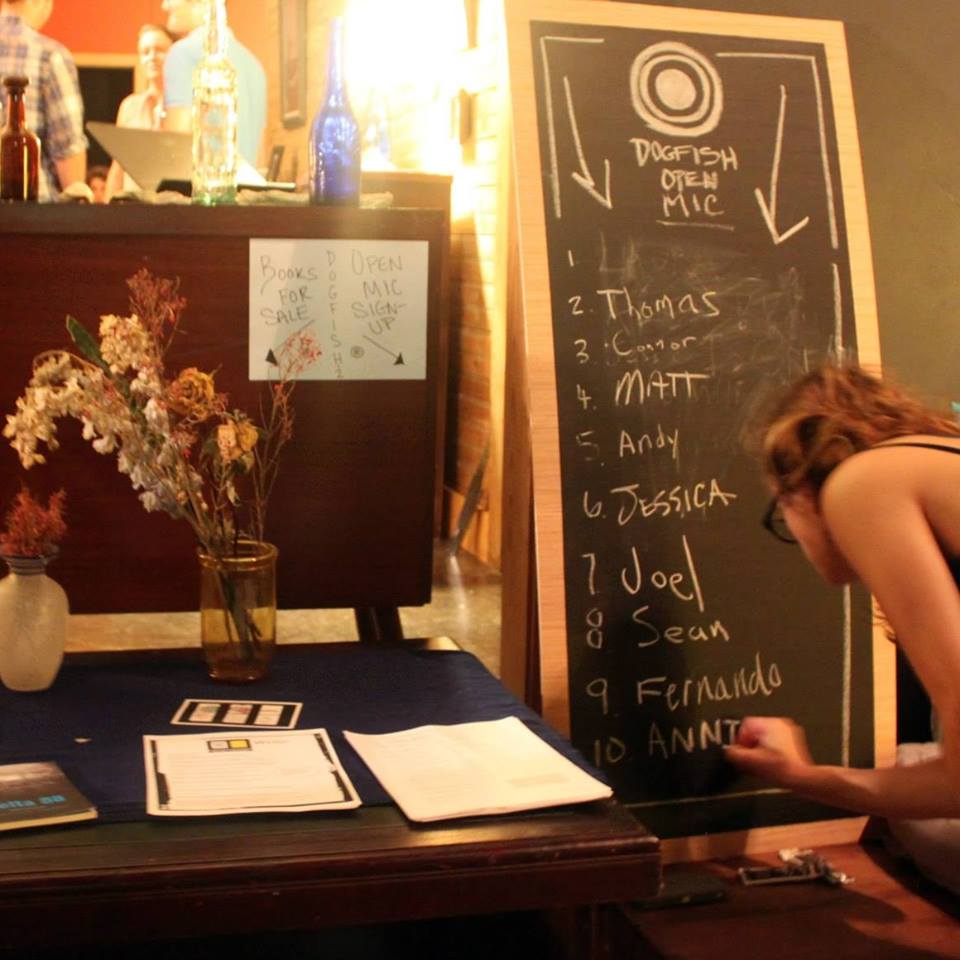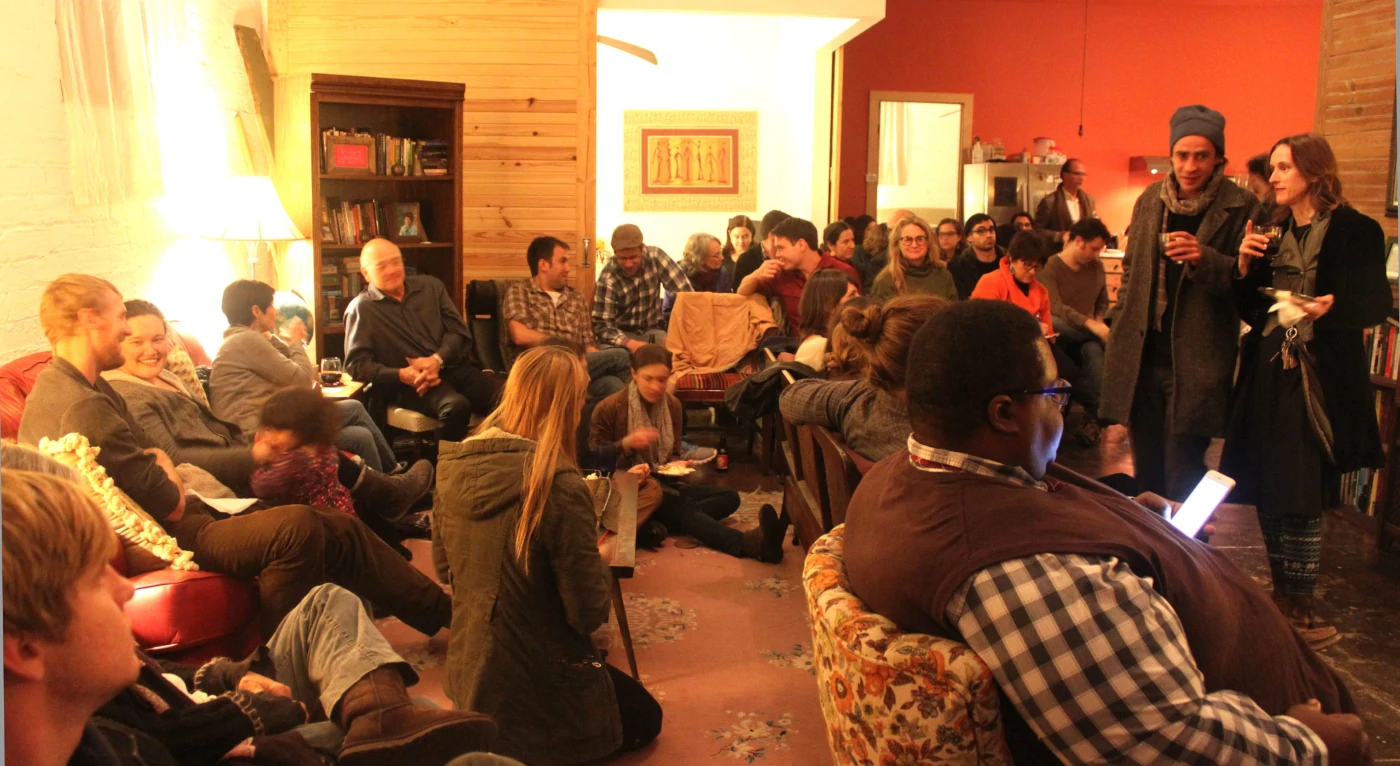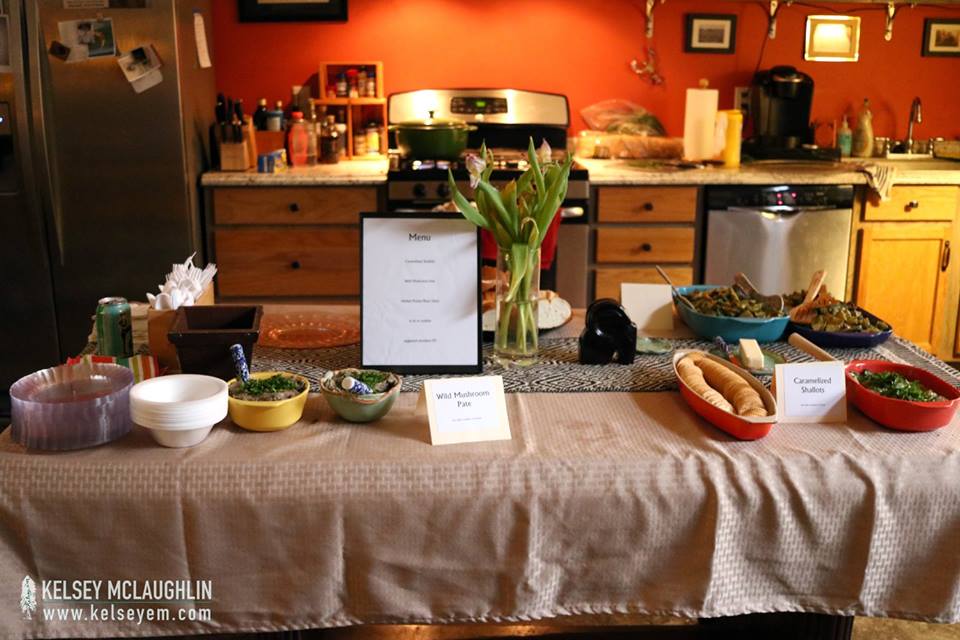Kitchen Table MFA: An Interview With Dogfish
Words By Jessica Kinnison, Cate Root, Alex Jennings, Taylor Murrow; interviewed by Nancy Reddy
This interview is part of the Kitchen Table MFA, a series that showcases writing communities through interviews and creative writing.
After the interview, be sure to check out the work of Dogfish members, Laura Mattingly and Benjamin Aleshire. Also, read Nancy’s essay on the Kitchen Table MFA series here.
Dogfish is a monthly reading series and open mic in the St. Roch neighborhood of New Orleans. Since 2015, its readings have featured New Orleans writers including Megan Burns, Cassie Pruyn, Alison Pelegrin, Ladee Hubbard, Jami Attenberg, as well as writers from elsewhere—like Cave Canem founder Toi Derricotte. Since 2018, it’s hosted the opening night of the New Orleans Poetry Festival, which this April featured Henk Rossouw, Chen Chen, Lee Ann Brown, and Oliver Baez Bendorf.

One of the things that makes Dogfish so special is that it takes place inside the home of series coordinator Jessica Kinnison’s, a former art space and bakery that was featured in Curbed New Orleans. The series is run collaboratively by Kinnison and three other writers—Alex Jennings, Taylor Murrow, and Cate Root—who are all chiming in here.
Nancy Reddy (NR)
New Orleans has lots of literary activity connected to the universities in the city. What do you see Dogfish’s role as in the literary scene? What need or niche did you want to address?
Cate Root (CR)
Our goal was to host a true community space, not an affiliate of a university or a store. You don’t have to spend any money at Dogfish, and that’s important to us. The idea is that if you can strip down as many barriers as possible—greet and welcome people at the door, ask them to make themselves at home, help themselves to food and drink, and just exist in this space with other people who also want some kind of connection—the space becomes its own sacred thing because of the intention people bring to it. There is a lot of ugly hierarchy and brutality in the world, and we can be a balm and bulwark against that, but it takes genuine work.
NR
There’s also a relationship between Dogfish and the New Orleans Writers Workshop. How do the aims of the reading series and the writing classes intersect or complement each other?
Jessica Kinnison (JK)
Taylor, Cate, Alex, and I challenge one another to build community and make a safe, welcoming space for everyone, particularly new writers. Writing can be a lonely pursuit. Finding your tribe—the folks who will urge you on—is so important. My hope is that our New Orleans Writers Workshop students know of at least one literary space where they will be welcomed with open arms. From there, and this has happened over and over again in recent years, I hope they will form writing groups, events and literary partnerships that will help them reach their personal writing goals.

NR
The landscape of neighborhoods has changed so much in New Orleans since Hurricane Katrina. Could you talk about what it means to have Dogfish located in St. Roch? What’s the neighborhood like, and what is the series’s relationship to your neighbors and the neighborhood?
JK
My house was a neighborhood bakery for more than half a century. As Cate said, while it is my personal living space, it takes on a sacred feeling once a month that, in my view, ties directly to the building’s long history of being a place of nourishment and restoration. Thinking of how our environment—neighborhoods, weather, buildings, opportunities, and physical landscape—has changed on so many levels since Hurricane Katrina, and continues to change, is heavy. I worry about respect daily. My chief goal is to respect my neighbors. Show up—move our trash cans back from the road, look out for the kids at play in the street, give folks who live nearby a heads-up when Dogfish is happening so it’s not too much of an inconvenience, roll the Dogfish ice from Brother’s corner store with neighbors offering a hand and always answer questions from neighbors and passersby about what the event is all about. We are just one of the house readings now present in New Orleans, including Rubber Flower Poetry Hour, Under the Creole Chandelier, Gathering of Sparks, and I’m sure many others I don’t even know of. Each space means something different to different communities. We try to listen to what works, what doesn’t, and shift along the way to keep things safe and keep them good.
NR
What other organizations (either literary or not) inspire you, or have you learned from? There are so many nonprofits and social entrepreneurship ventures operating in New Orleans right now. Are there any groups in the city that you’ve learned from, or that you’ve worked with or would hope to?
CR
I’m a member of the New Orleans chapter of the Democratic Socialists of America, and in many ways, I feel like Dogfish was the first organizing I ever did. The fact that we put on Dogfish as a gift to the community, that no one earns money on it and you don’t have to spend money to be there, is really important to me. Also everything I know about literary community I learned from Megan Burns, who runs the New Orleans Poetry Festival and Trembling Pillow Press. When I first started reading my poetry in New Orleans more than a decade ago, I was at Megan’s open mic. She’s kept the lights on for poets for so many years, and I’m blessed to know her.
JK
So many friends, teachers and communities helped us build our event. My teacher Christopher Chambers gave us the name. My teacher Sherrie Flick gave me advice gleaned from her wildly popular Pittsburgh series Gist Street. Taylor and I worked on the 1718 Reading Series at the Columns Hotel when we were students at Loyola University New Orleans over a decade ago now. Through that experience, we got to learn some of the basics of running a series and had the opportunity to spend time with some of our favorite writers. Writers whose readings I can still recall include late New York Times writer David Carr, poet Cate Marvin, poet and nonfiction author Rodger Kamenetz and poet Richard Siken. It was huge for us as young writers to have that time with our heroes. 1718 Reading Series is still run by Tulane and Loyola students at the Columns Hotel today. Other communities and groups that have challenged and inspired me include the compassion and hope shown by neighbors involved in the St. Roch Neighborhood Association, the collective spirit of Antenna.Works, and the fierce passion for poetry I’ve witnessed while helping Bill Lavender and Megan Burns coordinate the New Orleans Poetry Festival. Those two have taught me so much about building community, sustaining nourishing friendships, and making art.

NR
Any big hopes or plans for the future? What are your goals and hopes for Dogfish moving forward?
JK
Never get comfortable.
Alex Jennings (AJ)
Stay sustainable and keep the magic going.
CR
Replace ourselves. Meaning that our space inspires others to keep the lights on for poetry.
Taylor Murrow
Keep the community growing and leave it in good hands if/when we ever decide to step back.